My client finally turned up for their second meeting. He was late and the gap had been far too long. I could tell immediately that progress had been minimal, and that is being complimentary. I may be operating in the holy city of Jerusalem, but it was clearly time to “kick some aXXe”.
It is my job as a business mentor to find a way through the billowing clouds of excuses and to jolt people forward towards their commercial vision. I had a plan for the gentleman, and I was going to take no prisoners along the way.
I had taken stock of what I had to work with. Young, quietly clever, a very talented sales assistant, and relatively new to the city, our hero had little commercial background. However, I assumed (correctly) that he carried a hidden determination to succeed.
I laid out my pitch. It was time to stop talking about theories and to create a practical action plan. Agreed. OK, I asked, what is your target? The response: a few clients over the winter, although a 100 are needed to establish traction.
Fine, I said. We are going for 200 in 3 months. Gasp. Surprise. I then demanded a work schedule from next week, as to how he would haul in the magic 100. The key is to start from the end. In other words, understand what needs to be done in the final week, and then in the penultimate week. Etc. The confusion dissipated into full engagement. He had decided to enjoy the journey.
We laid out the basic “offer”. We determined the “how”. We considered “why” clients will buy in. We analysed his weaknesses, suggesting solutions to each one.
Sixty minutes later, the white board was pretty filthy. My client was looking bemused. Before entering my office, he had some vague concept. He was leaving with a lot of homework, and very much up for the fight.
And what had been the trigger? He was prepared to change, and I had seen that in the first meeting. I was able to utilize that fearless flexibility in him.
By the beginning of next week, he is expected to have drawn up a time chart to ensure he can fit in all the tasks over the coming weeks. Speak to me at the end of the winter to see what happened.




